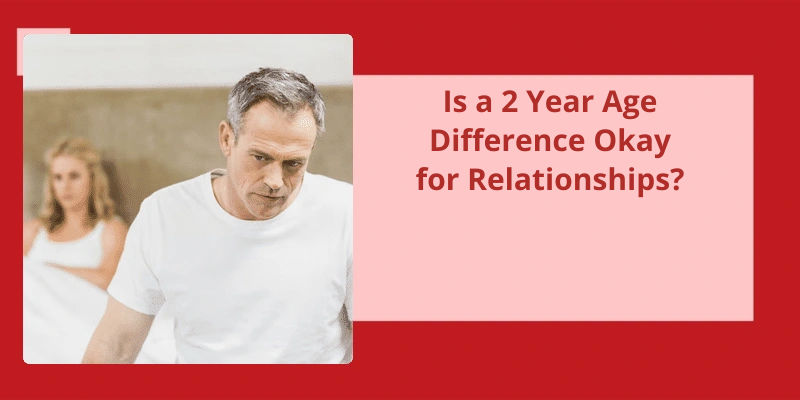The concept of age difference in romantic relationships has long been a topic of discussion and debate among individuals across various cultures and regions. While some deem it insignificant, others tend to attach a great deal of significance to it. In recent times, one of the frequently asked questions related to this topic is whether a 2-year age difference is acceptable in a relationship. While there are no definite answers to this question, numerous studies suggest that couples with an age gap of 1 to 3 years (with the man being older) are the most common and report the highest levels of satisfaction. However, as the age gap increases to 4 to 6 years and beyond, the level of satisfaction tends to decrease.
Is 2 Years a Small Age Gap?
However, the answer to whether a 2 year age gap is a small age gap is subjective and largely based on personal experience. It really depends on the dynamics of the family and the personalities of the children involved.
Another factor to consider is the parents own preferences and expectations. Some parents may want their children to be very close in age so that they can raise them together and have a more cohesive family unit. Other parents may prefer larger age gaps so that they can spend more one-on-one time with each child and focus on their individual developmental needs.
For some families, it may work out perfectly, while for others it may present challenges. Ultimately, the important thing is to focus on creating a healthy, happy family dynamic that meets the needs of all family members, regardless of their age differences. By staying flexible and open-minded, parents can help their children thrive and grow, no matter what the age gap may be.
The topic of age gaps in relationships can be a sensitive one, and many factors come into play when determining if it’s appropriate. While some age differences may not seem significant, others can raise concerns. It’s important to consider the specific circumstances of the individuals involved and how the age gap may affect the dynamic of the relationship.
Is 17 and 14 a Bad Age Gap?
Age differences in relationships have long been a topic of controversy. Often, people have their own opinions on what they think is right or wrong when it comes to the age gap between partners.
When it comes to relationships, age is just a number, but it’s important to consider the maturity level of each partner. At the age of 17, an individual may still be in high school, while a 14-year-old may just be starting their freshman year. This could lead to differences in priorities and interests. It’s crucial to make sure that both partners are at a similar stage in their lives and have the ability to understand their responsibilities.
However, if the relationship is purely platonic, then an age gap may not be as significant. Friendships can come in all forms, and as long as both individuals connect on a personal level, then age shouldn’t be a factor. It’s important to foster connections and support each other regardless of age.
Source: Is it okay for a 17-year-old to date a 14-year-old, the age …
Aside from the medical benefits, there are other advantages to having a 3-year age gap between siblings. Many parents find that this spacing allows the older child to adjust to the new addition and can make the transition to being a big brother or sister easier. Additionally, children who’re spaced out tend to have less sibling rivalry and can form closer relationships with each other as they grow up. In this article, we will explore the ideal age difference between first and second child and the benefits that a 3-year age gap can offer.
What Is the Ideal Age Difference Between First and Second Child?
Additionally, having a three-year age gap between siblings may also benefit their emotional and developmental well-being. Children who’re spaced farther apart in age may have more individual attention from parents and may have more time to establish their own identities before the arrival of a new sibling. This can lead to less sibling rivalry and a stronger bond between siblings in the long-run.
Furthermore, having a three-year age gap may also provide parents with some relief from the physical and emotional demands of parenting. By the time the second child is born, the first may have developed more independence and self-sufficiency. This can allow parents to focus more on their newborn without feeling overwhelmed by the demands of two young children.
Ultimately, there’s no one answer to what the ideal age difference should be between first and second children. It will vary depending on individual family dynamics and preferences. The most important thing is for parents to consider their own needs, the needs of their children, and make the decision that’s best for their family.
Pros and Cons of Having Siblings Closer in Age
Having siblings closer in age can provide a built-in playmate and companion, but it may also lead to more sibling conflicts and competition for attention from parents.
Age gaps in relationships can be a topic of controversy and concern for many individuals. While some believe that an age gap can bring certain advantages, others worry about the potential power imbalance and social stigma. However, according to recent research, there may be an ideal age gap that can lead to greater satisfaction in relationships. Let’s take a closer look at what the studies have found.
How Much of an Age Gap Is OK?
The idea of age gap in relationships has always been a hotly debated topic. It’s something that we all have different perspectives on, depending on various factors such as cultural background, personal beliefs, and individual preferences. However, research seems to indicate that in many cultures, an age gap of 1 to 3 years is considered ideal — but some researchers suggest even a relationship with an age gap of less than 10 years will bring more satisfaction.
This is because the larger age gap can bring a sense of novelty and excitement to the relationship, which can add a unique dynamic to the bond between the partners.
One thing to keep in mind, however, is that age differences can bring up certain challenges in relationships, such as differences in life experience, individual goals, and personal expectations. These challenges can be overcome through open communication and a willingness to listen and compromise with one another.
Ultimately, these are the qualities that will foster a healthy, fulfilling relationship, regardless of age difference.
Conclusion
What matters most is that both partners communicate openly and honestly, respect each other's boundaries and needs, and work together to build a strong, healthy relationship. Age should never be the sole defining factor in a relationship, and couples of all ages and age differences can find love and happiness together.






